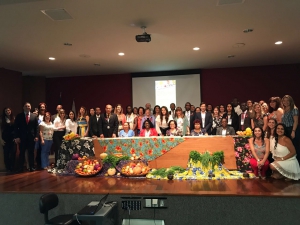Learning from Sustainable School Feeding in Brazil
The mission was promoted by the project to strengthen school feeding programs within the framework of the Brazil-FAO International Cooperation Program.

Brasilia, Brazil, October 2017 - A FAO/UN mission to Vitoria, Brazil took place between 8-11 October to learn and exchange views on experiences in sustainable school feeding. The mission was composed of a delegation from the Government of Guyana led by HE First Lady, Honourable Ministers of Social Protection, Social Cohesion and Education, as well as Ministers in the Ministry of Public Health, and of Public Affairs in the Ministry of the Presidency. The Delegation also comprised technical officers in the Ministries of Agriculture, Communities, Foreign Affairs and Education, respectively, and two representatives of civil society. The United Nations was represented by the UN Resident Coordinator/UNDP Resident Representative, the FAO Representative and the PAHO/WHO Representative.
The mission was promoted by the project Strengthen School Feeding Programmes in Latin America and the Caribbean within the framework of the Brazil-FAO International Cooperation Program an financed by the FAO Inter-Regional Initiative on Sustainable Food Systems for Food and Nutrition Security in Small lsland Developing States.
The mission was warmly received by the Mayor, Secretary of Education, teachers and staff from the Municipality of Vitoria in the State of Espirito Santo. After comprehensive presentations on the sustainable school feeding programme at the national, state and municipal levels by representatives of the National School Feeding Programme (PNAE) and by the authorities of Vitoria, the mission visited a primary/secondary school and a day care centre/ nursery school to observe the management of the school feeding programme.
On the second day, a visit was made to the town of Santa Maria de Jetiba where the team met briefly with the Mayor and Secretary of Agriculture of the town, following which, accompanied by the Secretary of Agriculture, it met with members of a farmers’ cooperative that supplies agricultural produce to the school feeding programme and toured Alta Santa Maria, where most of the small family farms are located.
School feeding has been mandatory in primary and secondary schools in Brazil since 1955, but in 2009, a new policy was introduced to establish a 30% minimum quota of procuring organic agricultural products from local farmers. This has obliged inter-disciplinary cooperation across line departments of education, health and agriculture to support local farmers in introducing organic farming and supplying schools with quality produce of nutritional value. To date, an average 25% of local procurement has been achieved countrywide.
Vitoria is a leader among 700 municipalities in Brazil, capitalising on its oil revenues, historic family farming tradition and strong decentralised governance and commitment.
The sustainable school feeding programme generates multi-dimensional benefits: access to fresh food, nutrition, hygiene, good health, good education, environmentally friendly agriculture and local/rural economic development. The primary/secondary school we visited has diverse menus tailored to nutritional needs of children with special health conditions. Students are part of the advocacy campaign to eliminate food waste. Studies have shown improvements in children’s learning capacity, increased attendance and behaviours.
The family farming cooperative received certification to supply the school feeding programme after two years’ investment in organic farming and now has a steady demand from 600 schools that constitutes 30% of its market.
The Mission was particularly amazed by the demonstration of the strong and dynamic engagement and ownership displayed by the communities, teachers, parents, cooks, students and farmers in driving the sustainable school feeding programme.
Women’s participation and leadership from community level up to the municipality level was also very visible.
The municipality triples the subsidy received each year from the Federal Government to finance the school feeding programme, while sectoral officers such as agricultural extension workers and nutritionists provide technical assistance to farmers and cooks hired from the community. Monitoring of the programme is also very important, involving communities and local councils who are not paid a salary except for their travel and other associated costs that are covered by the programme.
In the coming weeks, the mission members from the Government and the UN system will work together to examine how lessons learnt and experiences shared could be used to strengthen Guyana’s school feeding programme with applicable good practices from the Brazil experience.
What is absolutely critical for the success is the empowerment of communities in driving the various aspects of the programme from farmers to schools. The government plays an enabling role, through policy and quality standard setting, financial subsidization and quality technical assistance, responding to the needs of the communities - this requires strong inter-ministerial coordination, decentralisation of service provision and political will.
It will also require buy-in from stakeholders at the community level, including teachers, parents, students, cooks and local farmers.
